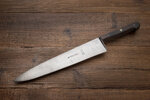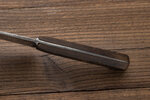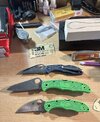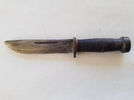
People that try to "clean up" a 80 year old knife that don't know what they're doing will do more harm than good.
You can see that someone took an angle grinder and/or a dremel to it and made a mess of it. They've "melted" the bevels and they skipped across the blade damaging the surface.
This is what a good condition version of this 225Q is supposed to look like.
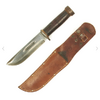
Best thing you can do is stay farrrrr away from power tools if you aren't an expert with them.


